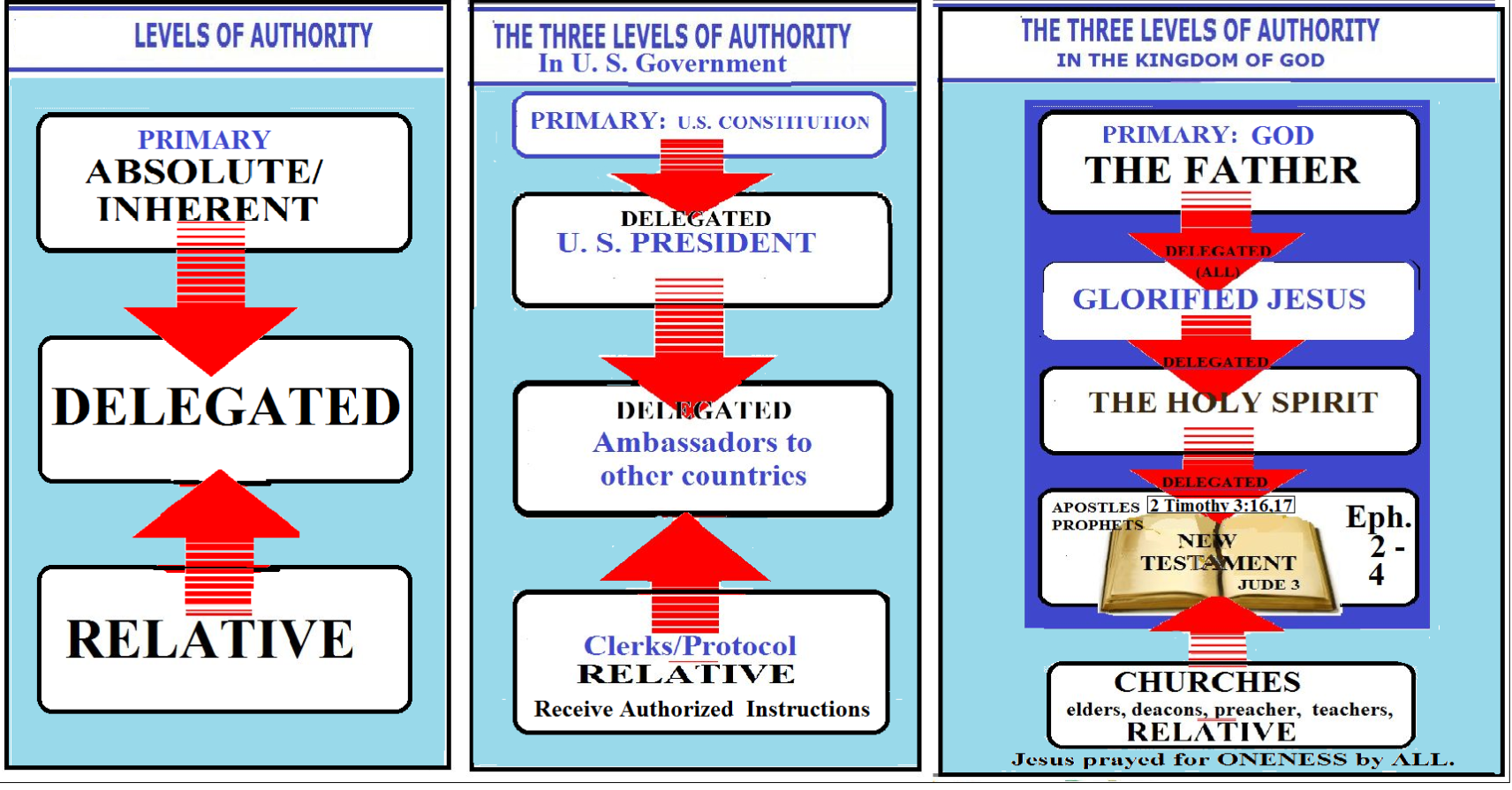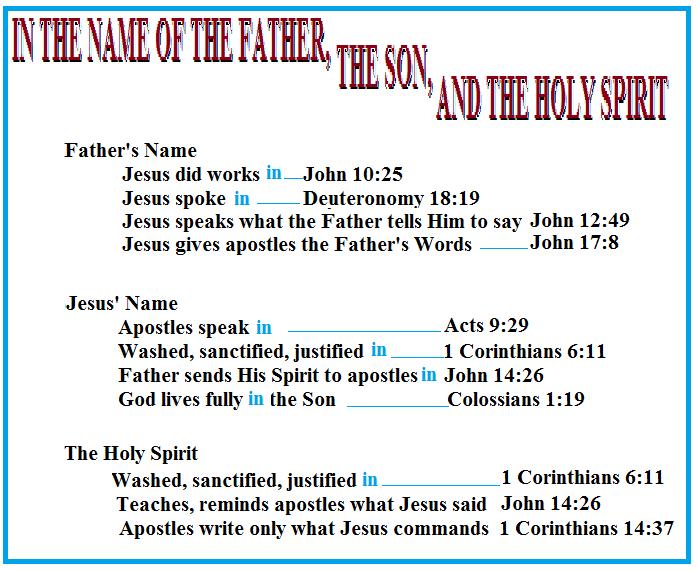
LEAVING THE DOCTRINE OF BAPTISMS 15-5
[Baptizing] “In The Name Of”, part # 5
An Analogy Of A Hierarchy Of Authority
Definition. Authority: “Power to influence or command thought, opinion, or behavior.” Merriam-Webster Online.
We have already considered and rejected the “incantation views” for the phrase “in the name of” in both Matthew 28:19 and Acts 2:38 when baptizing. I would consider now the argument that whether Matthew 28:19 had to be added in order to prove that Jesus is deity.i
I wondered why this verse would be considered for such a question since it does not deal with the subject of Jesus being deity at all. It does list all three persons without showing their nature; i.e., Father, Son, and Holy Spirit. This passage is not necessary to prove something that the gospels and epistles affirm. To me, it is evident that Jesus is assuring the apostles that His “having all AUTHORITY” is backed up by the Father, the Son, and the Holy Spirit. Indeed, all three are in harmony as one as Jesus said to the Father in John 17:21: “just as I am one with you and you are one with me” (CEV).
All legitimate authority emanates from God for God created all things. God asserts in the Bible that He has primary and absolute authority. “I am the LORD thy God” (Deuteronomy 5:6; Psalm 81:10). The Hebrew word for “LORD” is “Jehovah” but its Greek LXX equivalent is Kurios, which means “supreme in authority.”ii So, God claims, “I am the supreme authority, your God.”
God is Plural in the Old Testament. The Hebrew word singular for God is “El” (is used for the Creator in Malachi 2:10); however, generally, the plural “Elohim” is used when the word "God" in used the Old Testament Hebrew; e.g., Genesis 1:1. Look at the use of the plural pronouns in the creation account in Genesis 1:26, CEV: “God said, ‘Now we will make humans,iii and they will be like us. We will let them rule the fish, the birds, and all other living creatures.’” The verbs in the original are plural as well. “Behold, the man has become like one of Us, to know good and evil” (Genesis 3:22); “Come, let Us go down and confuse their language” (Genesis 11:7).iv
God is Plural in the New Testament. “In the beginning was the one who is called the Word. The Word was with God and was truly God. From the very beginning the Word was with God. And with this Word, God created all things. Nothing was made without the Word. Everything that was created” (John 1:1-3, CEV). The Word That Creates in this context is The Son. “The Word became a human being and lived here with us. We saw his true glory, the glory of the only Son of the Father. From him all the kindness and all the truth of God have come down to us” (verse 14, CEV). To deny the trinity is to deny what both Old and New Testaments say about God. “But now at last, God sent his Son to bring his message to us. God created the universe by his Son, and everything will someday belong to the Son” (Hebrews 1:2, CEV).
Jesus Humbly Comes Down. Paul was a Hebrew of Hebrews, a Pharisee (Philippians 3) but he wrote of Jesus as “our great God and Savior, Christ Jesus” (Titus 2:13). Similarly, Philippians 2:6ff speaks of Jesus being God along with God the Father. But Jesus is said to have humbled Himself in leaving Heaven. “Christ was truly God. But he did not try to remain equal with God. Instead he gave up everything and became a slave, when he became like one of us. Christ was humble. He obeyed God and even died on a cross” (CEV). Although equal to God, Jesus emptied Himself and came down to save the world.
The Father Awards The Son by Delegating Him Lord, the Supreme Authority. Continuing with Philippians 2:9, “Then God gave Christ the highest place and honored his name above all others. So at the name of Jesus everyone will bow down, those in heaven, on earth, and under the earth. And to the glory of God the Father everyone will openly agree, ‘Jesus Christ is Lord!’" The Father is excepted. He is still “above” Jesus. “When the Scriptures say that he will put everything under his power, they don't include God. It was God who put everything under the power of Christ” (1 Corinthians 15:27, CEV). Two persons: there is God who puts things under Christ, and there is Christ, called God’s Son (28a).
An example of delegating authority is our American Government. The assumption of primary authority is the people. The Constitution is the symbol of that authority. The Constitution delegates authority to the President. To communicate with other people, the President delegates authority to an ambassador to represent him. Relative authority is carried out in the function of the diplomatic affairs of state.
DELINEATION OF AUTHORITY In Business Or Government
1.
PRIMARY/ABSOLUTE/INHERENT.
Original
and source of authority.
2.
DELEGATED.
Power
that is delegated
formally. It includes a right to command a situation, commit
resources, give orders and expect them to be obeyed.
3.
RELATIVE.
Authority
for
a body to
perform a specific function, such as environment management, power
generation, or tax collection is
subject to the
rules
governing it.v

“In the name of God.” God has delegated authority in communicating to man. Initially, God delegated authority to Moses (Mark 7:9b, 10, KJV). To Moses, God had spoken of a later type of Moses, “And it shall come to pass, [that] whosoever will not hearken unto my words which he shall speak in my name, I will require [it] of him” (Deuteronomy 18:18, 19). The people cry, “Blessed is he that cometh in the name of the Lord (God)” (Matthew 21:9). Jesus asserts this fulfillment is Him. “For I have not spoken of myself; but the Father which sent me, he gave me a commandment, what I should say, and what I should speak” (John 12:49). The words of Jesus are as promised, the “words which he shall speak in [God’s] name”; i.e., in the name of God, the Father. Jesus’ words are God the Father’s message.
Delegated Jesus As Lord. Before Jesus ascended upon high Matthew records, “And Jesus came to them and spake unto them, saying, All authority hath been given unto me in heaven and on earth” (Matthew 28:18, ASV). That authority given to Jesus although delegated is now supreme. Peter announces in Acts 2:36, “God hath made that same Jesus, whom ye have crucified, both Lord and Christ.” Remember, “Lord” means supreme authority. Jesus is not just a prophet, He has been given the “supreme” authority heretofore invested in God. So, “God himself was pleased to live fully in his Son” (Colossians 1:19, CEV).
Delegated Ambassadors. Jesus has in turn delegated as His ambassadors His appointed apostles (not every Christian). The apostles and assisting prophets are Jesus’ “ambassadors” (Ephesians 6:20). They are the ones with the message “in the name of God” (Deuteronomy 18:18, 19, see above). The Lord Jesus prayed just prior to His hanging on the cross, “For I have given unto them the words which thou gavest me…” (John 17:8). Unto them; i.e., His apostles were given the words of God that were given to Jesus. And they were sent by Jesus. Jesus declared, “As the Father has sent me, so send I you” (John 20:21).
The Holy Spirit’s Role. And, Jesus says that He sends the Spirit from the Father: “But when the [Holy Spirit] is come, whom I will send unto you from the Father, even the Spirit of truth, which proceedeth from the Father, He shall testify of me” (John 15:26). “In Jesus’ name” in this context refers to Spirit testifying of Jesus.
Now God the Father sends His Holy Spirit “in Jesus’ name.” “But the Comforter, even the Holy Spirit, whom the Father will send in my name, he shall teach you all things, and bring to your remembrance all that I said unto you.” (John 14:26, ASV). The Holy Spirit guarantees that there will be no danger of error or mistake in their function as ambassadors. The apostles are special prophets. “The prophets did not think these things up on their own, but they were guided by the Spirit of God” (2 Peter 1:21, CEV). If we can find their original autographs or a facsimile, we will have a guaranteed message from our Supreme Authority.
Paul in Ephesians 3:5 says, “ [W]hich in other ages was not made known to the sons of men, as it is now revealed unto his holy apostles and prophets by the Spirit.” Again Paul claims, “If you think of yourself as a prophet or a spiritual person, you will know that I am writing only what the Lord has commanded ” (1 Corinthians 14:37, CEV). This delegated authority, therefore, is passed on to the inspired apostles, such as Paul, from the Lord by the Spirit.
The Devil’s opportunity to interfere with this revelation arrived when the apostles began proclaiming the gospel to mankind. According to the parable, “Those by the wayside are they that hear; then cometh the devil and takes away the word out of their hearts, lest they should believe and be saved” (Luke 8:12).

The New Testament teaches a united deity who exists in three persons but who are co-equal and co-eternal.vi My main point has been that the Bible declares one God in three persons all of whom share a common authority source. So what Jesus says or the Holy Spirit says, and what the apostles say (or do), is in the name of the Father, the Son, and the Holy Spirit.
Since the apostles wrote Scripture as ambassadors with the aid of being divinely inspired and controlled by the Holy Spirit of God sent from the Father via Jesus, we are obliged to give absolute obedience and reverence to His instructions in the NT.vii This is why it is so important to access, “study and handle aright the word of God” (2 Timothy 2:15). We worship not the paper but the source; the “oracles of God” (1 Peter 4:11).
Note. Translations: 1. CEV translation: Contemporary English Version.. 2. ABS translation 1995: claims not to be a paraphrase, but “an accurate and faithful translation.” I used it in this article because I felt it more clearly represented the original Greek in the passages that I quote.
Gaylon West
Throw Out The Lifeline
i F. C. Conybeare claims that the Trinitarian baptismal formula of Matthew 28:19 was not original to the text of Matthew. F.C. Conybeare, "The Eusebian Form of the Text of Mt. 28:19," ZNW 2 (1901): 275-88.
ii Strong’s Hebrew and Greek Dictionaries. The Greek OT translates Jehovah as Lord. Jesus is proclaimed Lord after His being raised from the dead.
iii Some explain away the use of the plural Hebrew Elohim for God in the OT as being language of the Kings (like the Anglo- Saxons thousands of years later. A Hebrew grammarian writer argues that Elohim is singular unless its verbs and pronouns say otherwise. However, Genesis 1:26 meets this criterion for God being plural. In other cases perhaps the Word only is doing the creating while Elohim conversed with Themselves. https://www.gci.org/god/elohim4
ivhttps://www.blueletterbible.org/faq/don_stewart/don_stewart_688.cfm
v There’s a fourth one that is of judicial nature, but is not relative to our discussion. http://www.businessdictionary.com/definition/authority.html
vihttps://bible.org/question/does-ielohimi-gen-11-mean-god-or-gods
vii http://www2.gracenotes.info/topics/authority.html

|